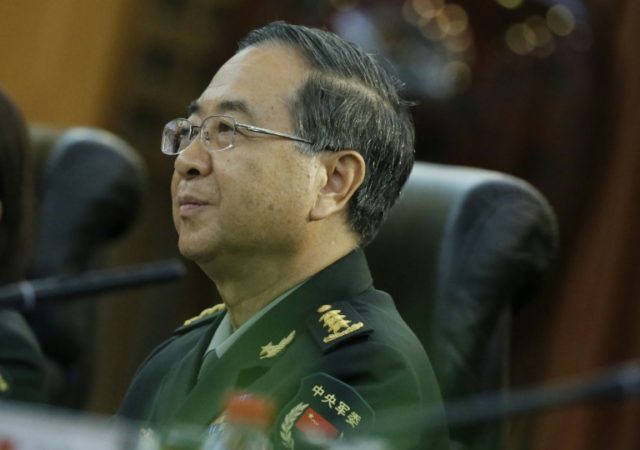China’s state news agency Xinhua confirmed on Tuesday that senior general Fang Fenghui will face charges of bribery before a military tribunal. Fang disappeared from the public eye in September 2017, right before the Communist Party’s national congress.
In a brief note reproduced at the state-run Global Times, Xinhua explained, “Fang Fenghui, member of China’s Central Military Commission (CMC) and former chief of staff of the CMC Joint Staff Department, had been transferred to the military prosecution authority on suspicion of bribery.”
Fang is the latest, and arguably highest-ranking, Chinese military official to face charges of corruption amid a purge of military and civilian communist officials launched by Communist Party leader Xi Jinping. The Communist Party replaced Fang as the head of the Joint Staff Department in August before his abrupt disappearance. His fall was a rapid one: Xi had brought Fang with him to President Donald Trump’s Mar-a-Lago estate for a visit to the United States in April.
The Chinese government has provided no details on the prosecution or the evidence that led them to arrest Fang. The Associated Press notes that a military prosecution “virtually ensures” that he will be found guilty and face a hefty sentence.
The South China Morning Post, which operates out of Hong Kong, cited unnamed sources who linked Fang to another high-ranking military official accused of corruption, Zhang Yang, who committed suicide last year. Zhang also disappeared shortly before the Communist Party Congress, suspected of paying millions in bribes to Guo Boxiong, one of two vice-chairmen of the Communist Party of China. He was placed under house arrest, however, where he was found after reportedly hanging himself on November 23.
Despite his gruesome end, the Chinese state media outlets attacked him for “severely harm[ing] the party’s image” and ending his life in a “shameful” manner.
“Fang has close links to Zhang’s superiors and subordinates because they were both protégés of disgraced former CMC vice-chairmen Guo Boxiong and Xu Caihou, with Fang being the most skillful opportunist, closely following Guo,” an unnamed military source told the South China Morning Post this week.
The source claimed that authorities had intended to announce Fang’s prosecution shortly after his disappearance in September, but Zhang’s suicide poisoned the political climate and officials chose to wait before revealing the military trial against him. “In order to decrease the impact of Zhang’s death to the army’s morale, Fang’s case was put aside a while until now,” the source reportedly said.
Xi Jinping has launched an extensive war on corruption within Communist Party ranks since he took over the head of government position in 2012. Three years later, Chinese officials announced they had arrested 14 generals for corruption crimes and dozens of lawmakers. That number has continued to rise since 2015, with no guarantee that the publically-known cases of corruption charges are the only existing ones. Skeptics have argued that Xi appears to be using a war on graft as a tool to purge any government officials suspected of being insufficiently loyal to him from civilian and military ranks.
Xi has promised to preside over a revitalized People’s Liberation Army. During October’s Communist Party congress, Xi said his regime would build “a world-class military by 2050 that can fight and win wars across all theaters.”
“We will speed up implementation of major projects, deepen reform of defense-related science, technology, and industry, achieve greater military-civilian integration, and build integrated national strategies and strategic capabilities,” he vowed.
Xi has also increased the frequency and scale of military exercises, most recently personally presiding over an exercise in northern China last week that involved 7,000 troops. Xi urged the soldiers to “strengthen combat readiness and put military training in a strategic position.”

COMMENTS
Please let us know if you're having issues with commenting.